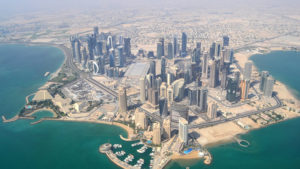The Qatar crisis is reverberating in Libya, inflaming political divisions in the war-torn oil exporter and dragging commodity-trading giant Glenco
The Qatar crisis is reverberating in Libya, inflaming political divisions in the war-torn oil exporter and dragging commodity-trading giant Glencore Plc into a dispute over crude sales.
The row involves competing administrations of the National Oil Corp. that are vying to control crude exports from the OPEC member. In eastern Libya, the local military commander is backed by Saudi Arabia, the United Arab Emirates and Egypt, three of the countries attempting to isolate Qatar. The head of the NOC in that part of the nation has accused Qatar of using its 8.5 percent stake in Glencore to control the the Swiss trader’s sales of Libyan crude.
The chairman of the NOC administration in the western city of Tripoli, Mustafa Sanalla, denied that Qatar has control over Glencore’s operations. He said NOC extended an agreement with Glencore to sell all quantities of Mesla and Sarir crude blends that exceed the needs of local refineries.
The deal, originally signed in 2015, was renewed in December and now runs through the end of the year, Sanalla said in a June 11 letter addressed to a Libyan legislator and given to Bloomberg.
“The National Oil Corp. succeeded in selling all the available production from Mesla and Sarir thanks to its contract with Glencore despite the fierce war for consumers in the international markets,” Sanalla said in the letter. “This contract allowed Libya to earn regular foreign currency inflows.”
Glencore declined to comment.
Instability Risk
Qatar, the world’s richest country per capita and biggest producer of liquefied natural gas, faces commercial isolation after Saudi Arabia, the U.A.E., Bahrain and Egypt cut economic and diplomatic ties with the country last week. Their gambit threatens to exacerbate instability in Libya, which is struggling to restore oil output and exports after it collapsed into lawlessness following a 2011 uprising.
The Abu Attifel oil field, operated by Mellitah Oil & Gas, resumed production after halting in March due to a technical failure and lack of storage space, a person familiar with the situation said Wednesday. In another sign of progress, the Sarah oil field also restarted pumping crude after the NOC announced it has settled differences with Wintershall AG, according to another person familiar with the matter.
Nagi Maghrabi, chairman of the eastern NOC, accused Qatar of “financing terrorists” in Libya through Glencore’s sales of the country’s crude. Qatar controls Glencore through its shareholding, he said in a June 9 interview with the Cairo-based Youm7 newspaper.
Glencore Stake
The Qatar Investment Authority, the nation’s $335 billion sovereign wealth fund, has a stake of less than 9 percent in Glencore. It also has significant shareholdings in Rosneft PJSC, Royal Dutch Shell Plc, Barclays Plc and Volkswagen AG. The QIA has no representatives serving on Glencore’s board so has no operational control over the company, Sanalla said in his letter, addressed to Yousef al-Akouri, a member of Libya’s parliament and president of the committee in charge of NOC affairs.
For Libya’s remaining crude blends, the Tripoli-based NOC has sales agreements with 15 other companies, Sanalla said. The companies include Eni SpA, Total SA, OMV AG, Repsol SA, Rosneft Oil Co., Lukoil PJSC, Cepsa, Saras SpA, Socar, Unipec, Vitol Group, Gunvor Group, Petraco SpA and BB Energy, he said.
Peter Grauer, the chairman of Bloomberg LP, is a senior independent non-executive director at Glencore.
bloomberg.com


